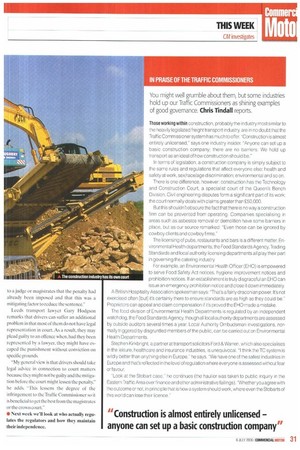IN PRAISE OF THE TRAFFIC COMMISSIONERS You might well grumble
Page 31

If you've noticed an error in this article please click here to report it so we can fix it.
about them, but some industries hold up our Traffic Commissioners as shining examples of good governance. Chris Tindall reports.
Those working within construction, probably the industry most similar to the heavily legislated freight transport industry, are in no doubt that the Traffic Commissioner system has much to offer. "Construction is almost entirely unlicensed," says one industry insider. "Anyone can set up a basic construction company; there are no barriers. We hold up transport as an ideal of how construction should be."
In terms of legislation, a construction company is simply subject to the same rules and regulations that affect everyone else: health and safety at work, sex/race/age discrimination; environmental and soon.
There is one difference, however: construction has the Technology and Construction Court, a specialist court of the Queen's Bench Division. Civil engineering disputes form a significant part of its work: the court normally deals with claims greater than £50,000.
But this shouldn't obscure the fact that there is no way a construction firm can be prevented from operating. Companies specialising in areas such as asbestos removal or demolition have some barriers in place, but as our source remarked. "Even those can be ignored by cowboy clients and cowboy firms."
The licensing of pubs, restaurants and bars is a different matter. Environmental Health departments, the Food Standards Agency, Trading Standards and local authority licensing departments all play their part in governing the catering industry.
For example, an Environmental Health Officer (EHO) is empowered to serve Food Safety Act notices, hygiene improvement notices and prohibition notices. If an establishment is truly disgraceful an EHO can issue an emergency prohibition notice and close it down immediately.
A British Hospitality Association spokesman says: "That's a fairly draconian power. Its not exercised often [but] it's certainly there to ensure standards are as high as they could be." Proprietors can appeal and claim compensation if it's proved the EHO made a mistake.
The food division of Environmental Health Departments is regulated by an independent watchdog, the Food Standards Agency, though all local authority departments are assessed by outside auditors several times a year. Local Authority Ombudsman investigations, normally triggered by disgruntled members of the public, can be carried out on Environmental Health Departments.
Stephen Kirkbright. a partner at transport solicitors Ford & Warren, which also specialises in the leisure, healthcare and insurance industries, is unequivocal. "I think the TC system is wildly better than anything else in Europe," he says. "We have one of the safest industries in Europe and that's reflected in the level of regulation where everyone is assessed without fear or favour.
"Look at the Stobart case," he continues (the haulier was taken to public inquiry in the Eastern Traffic Area over finance and other administrative failings). "Whether you agree with the outcome or not, in principle that is how a system should work, where even the Stobarts of this world can lose their licence."




































































































































































































